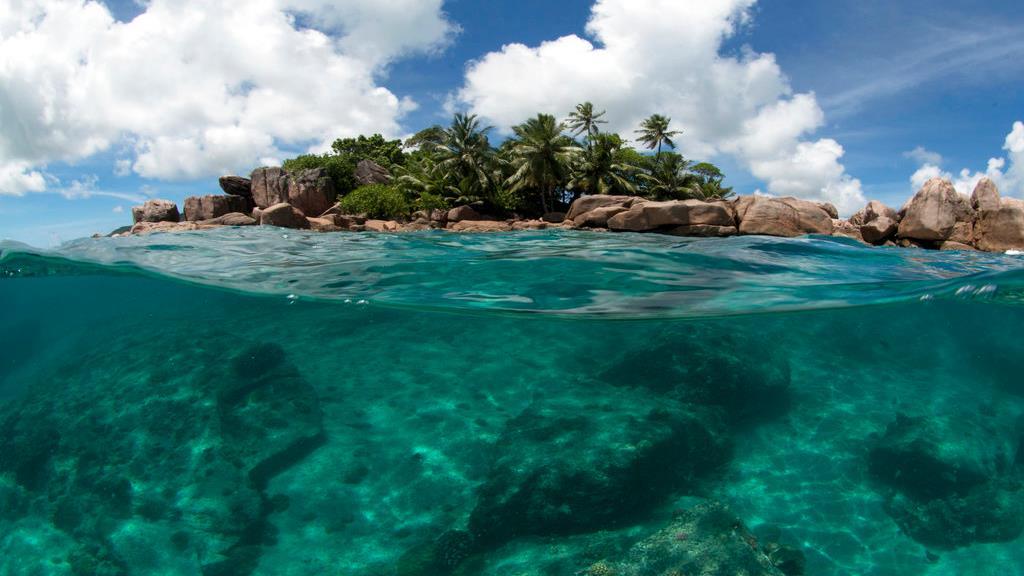Droegemeier and Neumayr: Why Trump's making ocean exploration a top priority
The White House is holding a summit on ocean science and technology -- here's why.
In January 1960, two fearless oceanographers eased themselves into a small steel sphere attached beneath a 50-foot submersible vessel and began an untethered descent to the bottom of the Pacific Ocean.
Almost five hours later, six-and-a-half miles down, under crushing pressure and surrounded by a pitch-black void, explorer Jacques Piccard and then U.S. Navy Lieutenant Don Walsh became the first people to reach the lowest known place on Earth, the Challenger Deep. For twenty minutes, the lights of their small craft, the Trieste, illuminated for humankind a place on our planet that had been dark for 150 million years.
Today, sixty years later, the United States is poised to lead a second era of bold innovation that will similarly reshape and expand human knowledge of the ocean, a priority for President Trump and his administration.
This extraordinary achievement began a golden age of underwater exploration, in which crewed submersibles helped make discoveries that dramatically expanded our knowledge in biology, geology, chemistry, oceanography and other fields. Today, sixty years later, the United States is poised to lead a second era of bold innovation that will similarly reshape and expand human knowledge of the ocean, a priority for President Trump and his administration.
To support these goals, the White House will hold a summit Thursday on ocean science and technology that will focus on building partnerships that advance marine science, promote new technologies and explore the unknown ocean.
Last year, President Trump signed an Executive Order to coordinate federal actions related to ocean science and technology and ocean resource management, and established an interagency ocean policy committee to do so. As co-chairs of the committee, our charge, in part, is to collaborate with the ocean community, identify priority ocean research and technology needs and maximize the effectiveness of federal investments in ocean research.
GET FOX BUSINESS ON THE GO BY CLICKING HERE
New and emerging technologies allow us to more efficiently explore and understand the ocean at a level of detail and at a geographic scale never before possible. Today, the Trieste’s descendants are fleets of autonomous vehicles that gather exponentially more information about the ocean for use by government and academic researchers, marine industries and others.
Advances in computing better inform expedition planning, make real-time mission decisions and analyze and visualize data. The remote detection of environmental DNA will enable researchers to identify marine life over large areas. In addition, artificial intelligence and machine learning will allow autonomous vehicles to read ocean conditions and coordinate their actions independent of human command.
CLICK HERE TO READ MORE ON FOX BUSINESS
The United States can harness these advances to dramatically increase our understanding of the ocean environment, from the countless ecosystems on which the health and productivity of the ocean and the planet depend, to the vast array of undiscovered natural resources, such as critical minerals, energy and marine-derived pharmaceutical compounds, which will collectively enhance our prosperity and security. This knowledge will inform policies and actions to ensure the conservation, management and balanced use of the ocean for the benefit of all Americans.
‘PATRIOTIC MILLIONAIRE’ MORRIS PEARL: WHY I SUPPORT THE ‘MILLIONAIRES SURTAX’ (YES, THAT’S RIGHT)
Achieving these breakthroughs will require partnerships that join scientific inquiry, entrepreneurial enterprise, philanthropic endeavor and public and private investment. It will also require a broadly defined but common direction to help guide our actions and ocean stewardship.
The United States should think boldly about how we organize ourselves to address the opportunities and challenges of our time. Only by working together, building on American values, investing in the next generation of scientists and recognizing the economic opportunity of discovery can we truly unleash our national potential.
STEVE FORBES: PRIVATE EQUITY AND JOB CREATION — WHAT THE LIBERALS CONVENIENTLY OVERLOOK
We look forward to joining with our government colleagues, policy experts and leaders in ocean science and technology across all sectors to build partnerships and pursue the extraordinary opportunities before us.
Through American innovation and advancements in science and technology, we will increase our economic competitiveness, strengthen our national security, protect our environment and preserve continued prosperity.
Dr. Kelvin Droegemeier is the director of the White House Office of Science and Technology Policy and Mary Neumayr is the chairman of the White House Council on Environmental Quality.




















